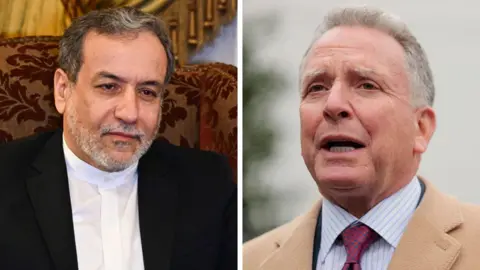US says latest round of nuclear talks with Iran were 'encouraging'
 Getty Images
Getty ImagesA fourth round of talks between the US and Iran over Tehran's nuclear programme have taken place in Oman, with both sides agreeing to meet again.
US Middle East Envoy Steve Witkoff said the discussions in Muscat were encouraging, while Iran's Foreign Minister Abbas Araghchi described them as "difficult but useful".
The US has insisted that Iran must scrap its uranium enrichment to prevent the country developing nuclear weapons, but Tehran denies it has such an aim and on Sunday again stressed it did not intend to give up the programme.
Donald Trump pulled out of a previous nuclear agreement between Iran and five other world powers in 2018.
He previously warned of possible military action against Iran's nuclear facilities if the fresh set of talks, which began in April, do not succeed.
Two previous rounds of the negotiations were held in Muscat with one taking place in the Omani embassy in Rome.
A senior US official said the latest discussions lasted more than three hours, adding: "Agreement was reached to move forward with the talks to continue working through technical elements.
"We are encouraged by today's outcome and look forward to our next meeting, which will happen in the near future."
Speaking to Iranian state TV, Araghchi said the talks had been "more serious and more direct" than on previous occasions.
"The two sides have now a better understanding of each other's positions. We can characterise the talks today as moving forward."
But Araghchi said "contradictory positions taken by the US in the media is not acceptable to us as they do not help the negotiations".
The talks came in the same week that Witkoff said in an interview with US media outlet Breitbart News that the US expects Iran to dismantle its uranium enrichment activities.
Araghchi said: "Enrichment is an issue that Iran will not give up and there is no room for compromise on it. However, its dimensions, levels, or amounts might change for a period to allow confidence-building."
Iran insists its nuclear activities are entirely peaceful and that it will never seek to develop or acquire nuclear weapons.
However, since Trump pulled out of the 2015 agreement - which expires later this year - Iran has increasingly breached restrictions imposed by the existing nuclear deal in retaliation for crippling US sanctions reinstated seven years ago, and has stockpiled enough highly-enriched uranium to make several bombs.
Under the terms of the 2015 deal, Iran agreed to only enrich uranium up to 3.67% purity for the next 15 years.
In February, the International Atomic Energy Agency (IAEA) nuclear watchdog reported that Tehran had stockpiled uranium enriched to 60% purity and could swiftly move to 90%, which would be weapons-grade.
The 2015 nuclear deal took nearly two years of intensive negotiations. At the start of this new effort to reach an agreement, Iran's programme is far more developed and complex, and the wider region is far more volatile.
